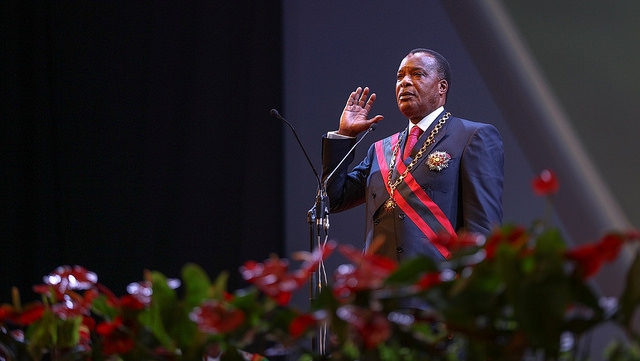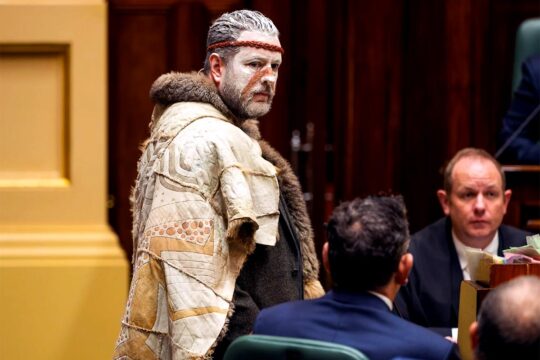As France called Tuesday for light to be shed on the Republic of Congo situation, the Congolese section of “Tournons la page” (Turn the Page), which has been working since 2014 for democracy in Africa, is calling for internationally mediated dialogue to resolve a crisis following March 20, 2016 presidential élections. The polls were won by Denis Sassou Nguesso, who ruled the country from 1979 to 1992, returned to power in 1997 after a civil war, then was elected in 2002 and 2009. The Constitution banned him from running again because of term limits and his age (72), but this changed after a controversial referendum. On April 18, Amnesty International reported a wave of post-election violence, including deadly government air strikes on residential areas of the south-eastern Pool region. Interview with Christian Mounzeo, President of “Together for Peace and Human Rights”, member of the “Turn the Page” NGO coalition.
JusticeInfo: You have called for a “frank and sincere” dialogue to “resolve the crisis without arms”…
Christian Mounzeo: The government is now using the pretext of a rebellion to clamp down on people who want only peace and security and for their vote to be respected. Arms are clearly being used as a ploy to justify and impose a military situation, whereas there are fundamental questions that need addressing, like the transparency of the electoral process, the way voting was conducted, the true outcome of the vote and the independence of the judicial institutions. All these issues need a political, not a military response, so there as an urgent need for political dialogue.
JusticeInfo: Do you think dialogue is possible when the opposition is saying the elections were rigged?
CM: Political opponents are being harassed, put under house arrest, banned from travelling and holding meetings. Some have been arrested, detained arbitrarily and illegally. In this context, where they are being deprived of their freedoms, dialogue remains the only way to defuse the situation.
JusticeInfo: Is the opposition ready for such dialogue?
CM: We don’t see why these opponents should not agree to a dialogue.
JusticeInfo: Are you suggesting a dialogue purely between Congolese, or with international mediation?
CM: Congo has had many rounds of peace talks since the armed conflicts of 1993-2002 started. But the fundamental reforms that were promised have not been implemented. Since political crises are still undermining peace, security and the rights of the civilian population, it is vital that such dialogue take place under international mediation, under the auspices of the United Nations, the European Union and why not also regional institutions like the Peace and Security Council of the African Union.
JusticeInfo : The Catholic Church is part of the Congolese section of “Tournons la page”. What influence does it have today?
CM: The Catholic Church clearly has influence given the number of Catholics in Congo. It is the most important religious institution. It has used its good offices to help resolve conflict situations in the past and its authority is not in doubt.
JusticeInfo: President Sassou Nguesso has mediated several regional crises. Is that an advantage?
CM: We could have prevented this crisis, because we saw it coming. But nothing was done to prevent it. Now the President is part of the crisis, he is a party to it, so we don’t think his experience has served his country well.
JusticeInfo: The office of the UN High Commissioner for Human Rights talks about mass arrests, torture and murder in the Pool region. Can you confirm this?
CM: Arrests and detentions are taking place day and night, and private homes raided. If you wanted to create a state of terror, that’s how you do it. In addition, the authorities have officially admitted they are carrying out “targeted bombing” as part of a so-called “police operation”. The areas concerned have been under army control for several years, militia have been disarmed and reintegrated. Up to now, the army has not shown any evidence that military arsenals have been destroyed. These bombing raids are causing material and human damage. Masses of people have fled to the forests and to Brazzaville, and there is serious risk of a humanitarian crisis.
JusticeInfo: You are calling for an “international” investigation into the violence in Brazzaville and the Pool region. Why not a Congolese investigation?
CM: People no longer trust the neutrality and independence of the public authorities because now they are taking sides in the conflict. And we have learned from the past that internal investigations are never seen through. People want an international, independent, impartial investigation.
JusticeInfo : There is a petition on change.org calling for France, the former colonial power and Congo’s leading economic partner, to put an end to the violence…
CM: Absolutely. We have learned from French authorities that in Congo they are playing the hand of discretion and diplomacy. How many violent elections, how much loss of life and destruction will it take for France, the country of human rights, to finally take a stand? We know that France’s voice weighs heavily in the European Union. We know also that our authorities are sensitive to what the outside world says, and especially France, their main partner. We are convinced that more open and direct involvement by France can help bring sustainable solutions in Congo.





